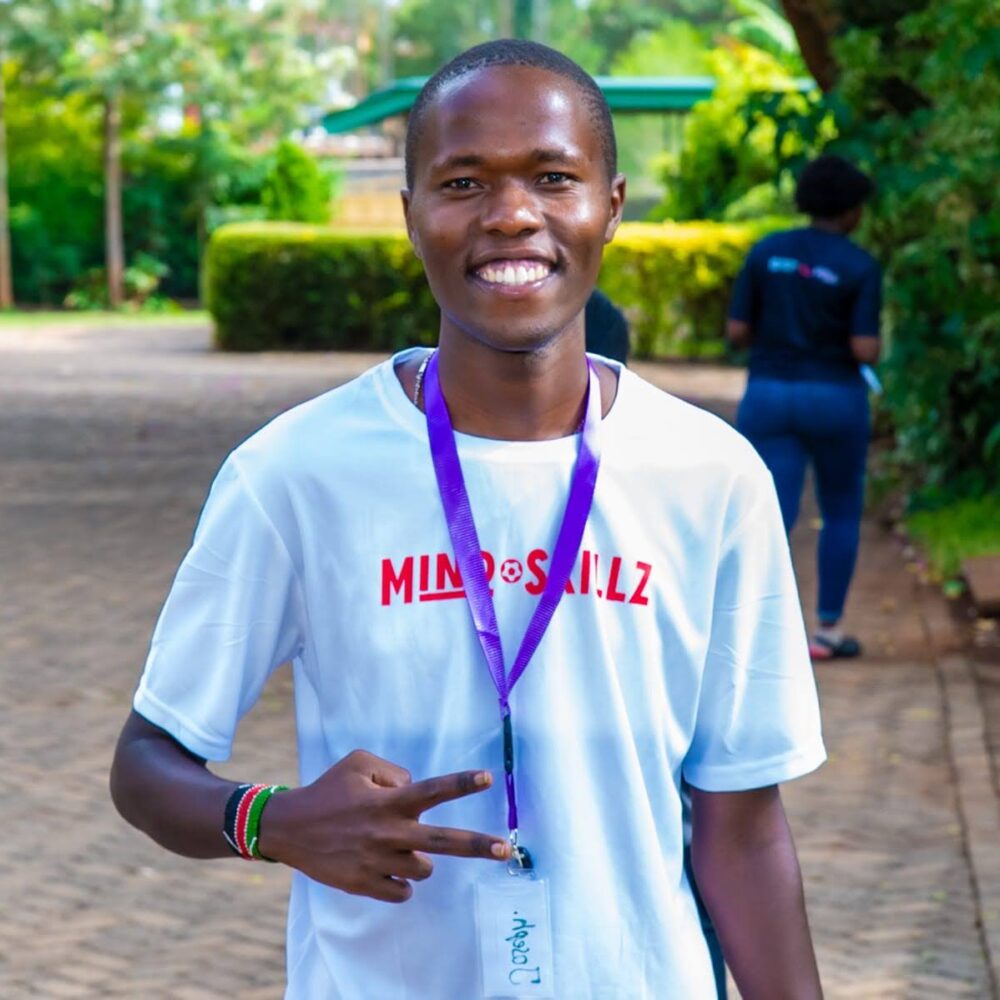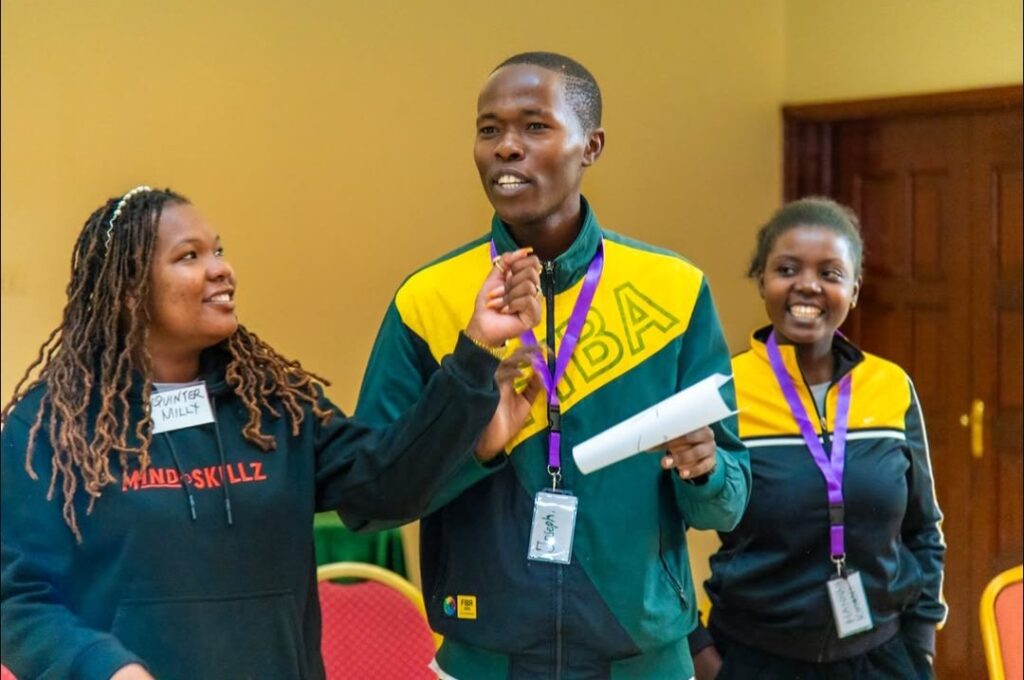From Personal Darkness to Community Light: Coach Joseph’s Story
July 28, 2025

Poor mental health is the most critical health issue facing young people globally, with 1 in 4 adolescents experiencing a mental health condition. In Kenya, this problem is even worse due to a combination of high stress, limited mental health knowledge, lack of mental health services, and high levels of stigma that prevent young people from seeking support. Recent evidence indicates that nearly one half of Kenyan high school youth were experiencing depression symptoms, and over one third were experiencing anxiety.
In response to this challenge, in 2024, Grassroot Soccer and LVCT Health partnered with the Departments of Health (DoH) in Nairobi and Mombasa Counties to co-develop, pilot, and evaluate MindSKILLZ: Grassroot Soccer’s sport-based mental health promotion and prevention program for adolescents.
The evaluation of the pilot showed a near 50% reduction in the number of participants with clinical depression symptoms and poor mental well-being. Findings also showed that participants improved their resilience and coping skills; enhanced their mental health knowledge, attitudes, and behaviors; and demonstrated benefits beyond mental health, including improvements in school engagement and academic performance.
One of the MindSKILLZ Coaches who brought the program to life in Nairobi is Joseph Macharia. As a Coach, Joseph guides participants through the program’s activities and serves as a crucial mentor and listening ear.
But Joseph’s own story is one of resilience. Having faced mental health challenges himself, he learned the importance of opening up to heal from past pains – an experience that helped him identify his calling as a youth advocate and led him to his role as a MindSKILLZ Coach.
He shares his story here:
When I was in my final year of primary education, my world shattered. My only sister passed away, and grief consumed me. I sank into suicidal thoughts, and two attempts to end my life only deepened my isolation.
In desperation, I turned to drugs and alcohol, which was my only escape from the pain. My grades plummeted, and by the time I sat my exams, the trauma had stolen my focus and hope. With nowhere left to turn, I fled the small home I shared with relatives, seeking refuge on the streets of Mukuru Viwandani, one of Nairobi’s largest slums.
Living in a makeshift shelter among friends, I faced hunger, danger, and the relentless noise of the settlement. Yet amid that hardship, I saw others quietly wrestling with their own despair, and it inspired me to make a change for myself. I began attending free counseling sessions, joined local youth groups, and most importantly, started sharing my story with others. In the simple act of opening up, I found two things: relief in being heard, and a spark of purpose in helping others carry their burdens.
With community support, I got a second chance. I earned a scholarship, rebuilt my academic life, and discovered a calling to champion mental health for young people who felt as alone as I once did.
I began volunteering with LVCT Health to support youth empowerment in Nairobi, and it was there that I first encountered MindSKILLZ, Grassroot Soccer’s mental health curriculum being delivered to youth through a partnership with LVCT. Although built around soccer, MindSKILLZ wasn’t about elite athletes. Rather, it was about ordinary adolescents – often wrestling with stress, grief, stigma, and uncertainty – coming together to talk about coping strategies in a fun and positive environment.
I saw in MindSKILLZ the very same safe space I had craved back in my darkest days in Mukuru Viwandani. It provided a place where young people could share, reflect, and build mental strength – and, importantly, have fun.
As a MindSKILLZ Coach, I have now guided more than 300 adolescents through the program. I’ve worked in settings ranging from community clubs and schools to children’s homes, and with groups ranging from teen mothers to youth in conflict with the law.
No matter where we are or who the group is, together we turn football activities into dialogues, allowing young people to speak about stress or loss through play.
We reflect in circles, sharing personal stories in small groups so each young person feels seen and supported.
We also set realistic goals, teaching participants to map short-term milestones – like practicing a new breathing technique before exams and celebrating every step forward.

One session I will never forget involved a group of teen mothers participating in an activity to explore self-care. Each time a participant dribbling a ball missed a cone, we paused to discuss setbacks and how to bounce back. By the end, the mothers were encouraging one another with words I once longed to hear when I was at my lowest:
“You’ve got this. Tomorrow is a fresh start.”
MindSKILLZ ripples beyond the field. Caregivers often say, “My child talks to me now, we are closer than ever.” In children’s homes, I’ve heard about evenings that now begin with “MindSKILLZ Talks,” where teens lead skits for their families about managing anger or finding hope. Local leaders have invited me to speak at barazas (community meetings) after noticing fewer neighborhood disputes – proof that when young people heal, entire communities thrive.
Our take-home MindSKILLZ Magazine – which is filled with relatable stories, coping tips, and creative prompts – extends each session’s impact. I have seen siblings reading the Magazine aloud to each other in their homes, and have watched a mother share breathing exercises from the resource with her daughter, turning the Magazine into a bridge between generations.

MindSKILLZ is for every young person. We ensure every activity is accessible. For example, we use textured balls for visually impaired participants, sign language support for those with hearing challenges, and simplified storyboards for learners of all abilities.
I believe every adolescent – whether in a children’s home, a settlement, or a classroom – deserves a chance to rebuild and thrive. Together with Grassroot Soccer, I am committed to this cause.
My journey has carried me to being named a NextGen Leadership Fellow by ForumCiv, earning a scholarship to study Public Policy & Governance at Strathmore University. The confidence I gained from leading MindSKILLZ sessions has become the foundation for advocating in county assemblies, on radio shows, and at community forums.
From my darkest moments in Mukuru Viwandani to leading mental health sessions under stadium lights, my personal mission remains the same: to ensure no young person ever feels they must face their pain alone. Through the universal language of sport, we pass on hope, resilience, and the simple power of being heard.
I am Joseph Macharia, and this is why I am a SKILLZ Coach.

